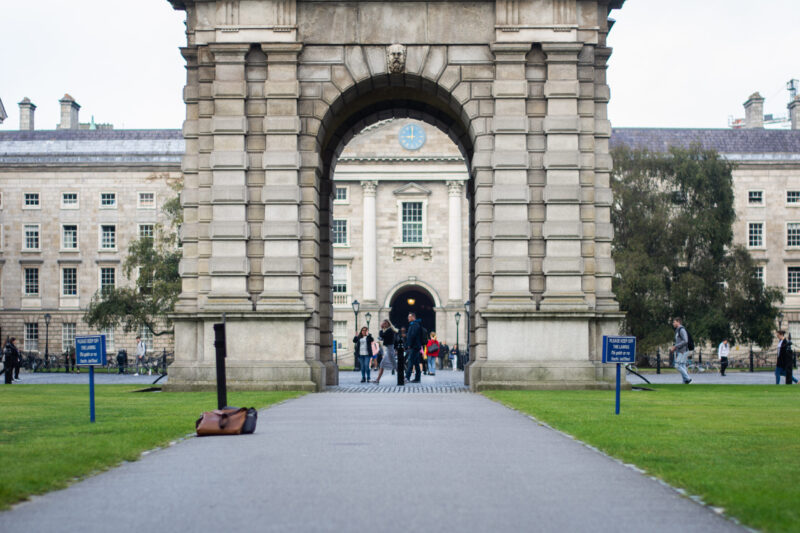The heart of College, House Six, is home to Trinity College Dublin Students’ Union (TCDSU), the Central Societies Committee (CSC) and a number of society rooms. House Six is also physically inaccessible to wheelchair users like myself and many other students with disabilities. Feeling alienated from House 6, I was reluctant to get directly involved with College politics until last year.
The number of students with disabilities in third-level education has been on a steady rise in recent years. Students with disabilities make up 12 percent of the undergraduate population in Trinity, according to the Disability Service report of the 2019/2020 academic year. The rising number of students with disabilities has not been met with a rise in activism around disability issues within the TCDSU bubble.
The general disinterest in disability issues by TCDSU candidates is something I’ve seen year after year when the sabbatical elections roll around, so I can’t say I was completely shocked by the lack of importance placed on the issue this year.
Around election season every year, I have been inundated with messages from sabbatical candidates reaching out to me as a student with a disability, wanting to know what they can do for students with disabilities if elected. I’ve always been appreciative of candidates who are willing to listen and learn about issues they are not knowledgeable about.
Meeting the different candidates for coffee, we’d speak at length about the issues facing students with disabilities in Trinity. The first year or two this happened, I was so hopeful that what I had said to the candidates would make a difference. I was disappointed to see no mention of disability in the manifestos of candidates I had felt really listened to me and promised they’d make Trinity more accessible. I came to the upsetting realisation that some of these candidates didn’t actually care about disability issues and were just reaching out to me to look like they’re covering all their bases.
The general disinterest in disability issues by TCDSU candidates is something I’ve seen year after year when the sabbatical elections roll around, so I can’t say I was completely shocked by the lack of importance placed on the issue this year
As Officer for Students with Disabilities in the Union, I have a more vested interest in the elections this year. I was disappointed to have only had seven out of the original 13 candidates reach out to me the week before campaigning began. Even worse than this, some of the candidates didn’t even bother to mention disability or accessibility in their manifestos whatsoever.
Even less candidates go on to flesh out actual specific ideas of how to increase accessibility in Trinity. Saying things like “I’m going to make everything accessible!” is vague and unrealistic. I want to know how this proposed accessibility will be delivered. I can only hope that the candidates keep these promises if elected.
Earlier last week I met with Courtney McGrath of the Ability Co_op, and Chloe Staunton to discuss the questions we want to ask the candidates at the equality and diversity hustings on Friday. We were all in agreement that the word “accessibility” was a buzzword that was thrown around by candidates. Many candidates this year are guilty of this. What does accessibility mean? If you were to ask the candidates, I’m sure you’d receive a lot of vague, unsure answers about how they plan on delivering this.
McGrath noted that, “throughout my time in college, being involved in the students’ inion and the Trinity Ability Co_op, I have not seen major disability activism for the SU sabbatical officers. Students with disabilities are done with empty promises, if you say ‘accessibility for all’ you should deliver”. I admit that I agree with her.
The accessibility of the manifestos this year has improved, but still have a long way to go. Reading through the manifestos, I noted the use of accessible fonts. A number of candidates offered alternate audio versions or screen-reader friendly versions of their manifestos. Although this is appreciated, I wonder why the manifesto can’t just be made fully accessible in the first place. Why is accessibility an afterthought?
Saying things like ‘I’m going to make everything accessible!’ is vague and unrealistic. I want to know how this proposed accessibility will be delivered
When placed through Blackboard ALLY, a tool introduced by Blackboard to check the accessibility of content, only one of the 12 manifestos was found to be totally accessible, according to the Disability Service. The accessibility report, provided by Blackboard Ally, detailed the issues of untagged PDFs and missing alternate text. These issues are quite easy to resolve, so it’s disappointing candidates didn’t take the extra step to fix them.
In a disappointing – but again, not shocking – turn of events, only one or two candidates actually impressed me at the equality and diversity hustings last night when answering the questions McGrath, Staunton and I prepared for each candidate. I heard the word “accessibility” with no specific development that the word stopped making sense to me altogether.
A disregard of the issues affecting students with disabilities is one thing, but actual ableism is a more sinister issue which has already reared its head during the campaigning period. I found myself growing quite sad on the night, having the thought that awareness about disability issues and accessibility have made no further progress during my time in College since I started five years ago.
Although I am quite cynical about sabbatical candidates making promises in general, I do have some hope that change will happen and Trinity will become fully accessible to all students with disabilities in years to come. Trinity has a strong disability community and I have faith that disability interests are safe in their hands.
Niamh Herbert is the Trinity College Dublin Students’ Union Officer for Students with Disabilities.







